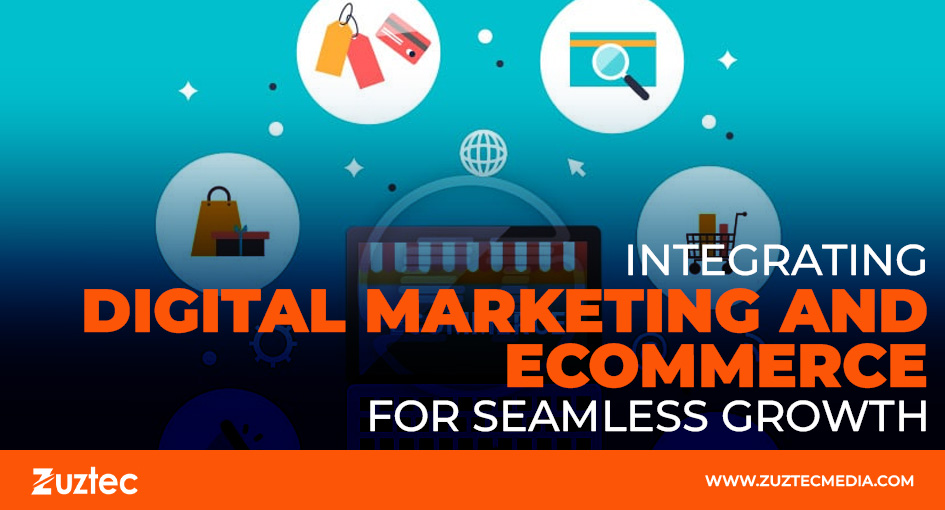
Integrating Digital Marketing and Ecommerce for Seamless Growth
In today’s fast-paced digital world, businesses need to be agile and strategic to stay ahead of the competition. This is particularly true in the ecommerce sector, where customer expectations are constantly evolving, and new marketing technologies are emerging at an unprecedented rate. Consumers are more connected, informed, and demanding than ever before, requiring businesses to adopt smarter strategies to meet their needs and stand out in an increasingly crowded marketplace. For ecommerce businesses, the path to success often lies in seamlessly integrating digital marketing and ecommerce efforts, creating a cohesive experience for customers from their first interaction with a brand to the final purchase and beyond.
When done correctly, this integration can lead to improved customer engagement, higher conversion rates, and sustained long-term growth. Digital marketing serves as the driving force that attracts potential customers, while ecommerce platforms provide the infrastructure for completing transactions and delivering customer satisfaction. By aligning these two essential components, businesses can create a seamless and personalized shopping experience that not only drives sales but also builds brand loyalty.
In this article, we will explore the importance of integrating digital marketing and ecommerce, share actionable best practices for achieving seamless growth, and discuss how businesses can optimize their digital marketing efforts and ecommerce platforms to deliver better results and achieve lasting success in today’s competitive market.
Digital Marketing and Ecommerce: The Importance of Integration
The landscape of digital marketing has changed dramatically over the last decade. Consumers are more tech-savvy than ever, and they now have access to a wealth of information at their fingertips. As a result, businesses need to be present at every touchpoint throughout the customer journey from discovery and engagement to conversion and post-purchase. Digital marketing is an essential component of driving traffic to ecommerce platforms, while ecommerce provides the platform for making sales and delivering the desired customer experience.
Integrating digital marketing is crucial because it creates a cohesive strategy that aligns marketing efforts with the online shopping experience. Without proper integration, businesses risk delivering a fragmented experience to customers, which can lead to missed opportunities, customer frustration, and lower conversion rates.
The Benefits of Integration
The key benefits of integrating digital marketing and ecommerce are numerous. By aligning these two powerful forces, businesses can optimize their marketing efforts, enhance user experience, and achieve measurable results. Here are some of the most significant advantages:
- Increased Customer Engagement
A seamless integration between digital marketing ensures that customers experience a personalized journey. With the use of digital marketing tools like email campaigns, social media ads, and content marketing, businesses can engage customers at various stages of their journey. For example, remarketing ads can target users who abandoned their shopping carts, while email marketing can nurture leads and encourage repeat purchases. This continuous engagement helps build trust, enhances customer relationships, and drives more sales.
- Improved Data and Insights
When digital marketing and ecommerce are integrated, businesses can collect valuable data from both sources in one place. This data can then be analyzed to understand customer behavior, preferences, and buying patterns. For example, knowing which digital channels are driving the most traffic to your ecommerce site can help refine your marketing efforts. Similarly, integrating customer purchase data with marketing platforms allows for better segmentation, leading to more targeted and effective campaigns.
- Streamlined Operations
By integrating ecommerce and digital marketing platforms, businesses can reduce manual processes and streamline their operations. This reduces the likelihood of errors and miscommunication between teams, enabling a smoother workflow and faster decision-making. For example, product updates on an ecommerce site can automatically reflect in your marketing campaigns, ensuring consistency across all platforms. Additionally, automated workflows can improve the efficiency of customer service, order processing, and inventory management.
Best Practices for Integrating Digital Marketing and Ecommerce
Now that we understand the importance of integration and its benefits, let’s explore the best practices for ensuring seamless growth in your digital marketing strategy.
- Use Integrated Marketing Platforms
To achieve a seamless integration, businesses should invest in integrated marketing platforms that connect digital marketing tools with ecommerce systems. Platforms like Shopify, WooCommerce, and Magento allow businesses to manage both their online store and marketing campaigns in one place. By using these platforms, businesses can create a unified experience for customers and streamline operations.
- Leverage Customer Data
Data is the backbone of successful marketing and ecommerce strategies. Businesses should utilize customer data to create personalized experiences. This can include product recommendations, personalized emails, and targeted ads based on browsing history. By using data-driven insights, businesses can ensure that their marketing efforts are highly relevant to their customers, improving the likelihood of conversions.a
- Create a Consistent Customer Journey
From the moment a customer discovers your brand to the point of purchase and beyond, their experience should be seamless. Ensure that the messaging in your digital marketing campaigns aligns with the design, functionality, and promotions on your ecommerce site. A consistent and coherent customer journey builds trust and leads to better conversion rates and customer loyalty.
In conclusion, integrating digital marketing and ecommerce is no longer optional for businesses looking to stay competitive in today’s digital landscape. By creating a seamless connection between these two essential components, businesses can enhance customer engagement, improve conversion rates, and ultimately drive growth. By leveraging integrated platforms, using data insights, and ensuring a consistent customer experience, businesses can maximize the effectiveness of their marketing efforts and ecommerce operations. With the right strategy, businesses can achieve sustainable growth, increase ROI, and build lasting relationships with customers.

